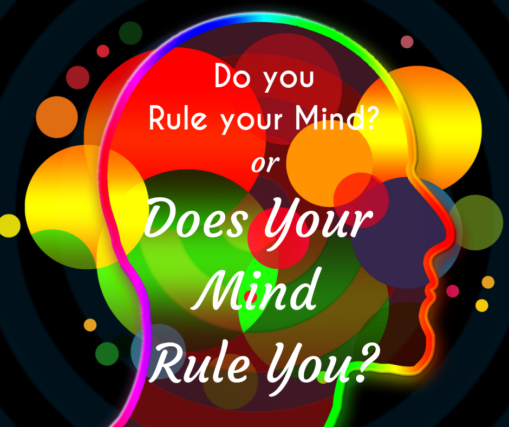
You GOTTA train your mind to be stronger than your emotions if you want to WIN in the game of life.
Your emotions are tied to everything you do or don’t do.
Confidence and courage can move you forward.
Fear and self-doubt can paralyze you.
Your emotions are always affecting your life.
When we act on our emotions too quickly, or when we act on the wrong kinds of emotions, we can make decisions we later regret. Trust me, I know LOL
Negative emotions, like anger, hurt or bitterness tend to easily spiral out of control especially right after they’ve been triggered.
Sometimes they seem to grow and take over just like weeds. I’ve had weeds take over my garden so this is an image that comes easily to my mind.
Negative thoughts grow so easy-and can dominate our lives in no time.
All you have to do is think the word ‘SHOULD’ or “SHOULDN’T” and before you know it, you’re fertilizing those disempowering thoughts.
“I should be this way or that way.”
(feel sad or disappointed that you’re not)
“They shouldn’t do that, say that, be that way.”
(feel angry because they are)
“I should have such and such done.”
(feel ashamed, guilty, less than)
Now you’re viewing situations as:
unfair, harmful, wrong
and you’re feeling like you have no control.
This is the PERFECT SEED BED for
NEGATIVE THOUGTS to grow.
When something “SHOULD” be a certain way and it isn’t, we begin to “CATASTROPHIZE” and see things as terrible, horrible and unbearable.
It increases STRESS and OVERWHELM.
Your negative thinking intensifies your negative emotions which intensify your negative thinking which intensify your negative emotions and it becomes a vicious cycle that keeps you stuck.
Here are seven steps that can help you manage your feelings before they manage you.
Step One
DON’T REACT RIGHT AWAY
Take time to PAUSE. Take several deep breaths. Remember that deep breathing triggers the VEGAS nerve at the bottom of your spine which sends neurotransmitters to your brain that actually CALM you down. This will help stabilize that overwhelming impulse.
Step Two
BE CONSCIOUS OF YOUR THOUGHTS
Thoughts are habitual. Ninety percent of your thoughts tend to be the same each day. It can be quite difficult to become aware of them as we’re used to focusing on what’s going on outside of us instead of inside of us.
Before you can change your thoughts for the better, you have to be aware of what you’re thinking.
Step Three
ASK YOURSELF WHY
Once you are aware of your thoughts, ask yourself what is causing this feeling inside of you?
What’s the trigger? What’s going on inside of me that makes me react and feel the way I do?
Step Four
CHANGE THE WAY YOU THINK
Once you know the root of the problem, you can change the way you think about it. Your thoughts shape your feelings.
How else could you look at this situation? Can you find a different way to think about it that helps you to feel less stressed, less anxious?
Sometimes it’s good to consult a friend as it’s easy to get boxed in with your own thoughts.
Step Five
SET YOUR INTENTIONS
Choose how you want to react ahead of time. The way that we react and manage our emotions is a habit. Are you controlling your emotions or are they controlling you?
Once you can control your emotions, then you will feel more in control of your life. Life is easier when you are in control. Life is less stressful when you are in control.
Sometimes we need to quit worrying about controlling so many other things in our life and start spending our energy on learning to control ourselves. (our thoughts, beliefs and emotions)
Step Six
MODIFY YOUR EXPECTATIONS
Take a look at your expectations. Your expectations cause you the most disappointment and stress in your life.
Can you modify them? Are they really realistic?
What’s more important-your health, happiness and loving relationships or your expectations?
Which would you rather give up? Would you rather hang onto your expectations or would you rather be happy?
Step Seven
DELETE NEGATIVE THINKING
It’s easy to get caught up in habitual negative thinking which causes you emotional turmoil.
We tend to replay certain situations (usually negative ones) over and over in our mind and experience the same feelings again and again– strengthening them with each replay.
You’ve got to break out of negative thinking.
Download my free 5 Strategies which will help you break out of negative thinking by going to https://www.fayprairie.com////gettheguide
We tend to think of our emotions (E) and our intelligence (I) as two separate things.
Put them together as emotional intelligence (EQ), and it’s a different way to be smart because it’s “the capacity to be aware of, control, and express one’s emotions calmly and compassionately, and to handle interpersonal relationships in an empathetic and fair way.
Some would say that developing your emotional intelligence (EQ) is more important to being successful and happy in life than your intellectual intelligence (IQ).
A high IQ is something we tend to be born with while emotional intelligence is something we can work to improve.
We can take steps to get emotionally “smarter.”
Each time we practice the seven steps listed above, they become easier and pretty soon they just flow naturally.
It will be worth your practicing!
If you’d like to visit more about learning to take control of your mind which is the most powerful tool you have–e-mail Fay fay@fayprairie.com to set up a FREE, NO OBLIGATION 30 minute coaching session.

 Have you ever said,
Have you ever said, Who’s choosing your channels??
Who’s choosing your channels?? Last week I wrote about managing emotions and I gave you the first three steps to get you started. Today we’re going to learn the next four steps.
Last week I wrote about managing emotions and I gave you the first three steps to get you started. Today we’re going to learn the next four steps.
